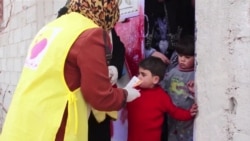Dr. Paul Offit is an infectious disease specialist and an expert in vaccines. He’s been at Children’s Hospital of Philadelphia since 1992. Since then he says not a year has gone by when he has not seen a child die from a vaccine-preventable disease. It’s largely, he says, because the parents chose not to vaccinate their child.
Far from Philadelphia, along the rugged border between Pakistan and Afghanistan, health workers are desperately trying to vaccinate every child against polio so no child will ever again suffer the crippling effects of this disease. If they can complete this task, polio will be a disease of the past.
Offit says the difference between parents in this mountainous border region of southcentral Asia and those in the U.S. is that in Pakistan and Afghanistan, people know the devastating consequences of polio. He says previous generations in the U.S. did, too.
WAYCH: Some Parents More Wary of Vaccines Than the Diseases Vaccines Prevent
“For my parents, who were children of the 1920s and 1930s, they saw diphtheria as a routine killer of teenagers. They saw polio as a common crippler of children and young adults, so you didn’t have to convince them to vaccinate me, my brother and sister.”
Offit says parents in his generation were also quick to vaccinate their children.
“I had measles. I had mumps. I had German measles (rubella). I had the chickenpox so I know what those diseases felt like, and it was miserable,” he said.
23 viruses, two cancers
Vaccines can prevent 23 viruses and two types of cancer, and more vaccines are in the works, including one for HIV, the virus that causes AIDS. Offit is the co-inventor of a life-saving rotavirus vaccine.
But some parents are not getting their children vaccinated. Last year there were more than 14,000 cases of measles in Europe, mostly in Romania. Nearly 40 children died. It exasperates health officials like Miljana Grbic, head of the World Health Assembly in Romania.
“We cannot fight this disease if we do not increase vaccination coverage,” she said. “... But we also have to understand why vaccination coverage is going down.”
For some parents, it’s the inconvenience of the trip to the doctor’s office. Others think good hygiene and nutrition are all children need to stay healthy. Still others believe vaccines can give their children autism, diabetes and other diseases.
Offit says persuading these parents to vaccinate their children is hard.
“It’s hard to compel people to vaccinate against something that they don’t fear,” he said. “And when they don’t fear that, what they’ll do is, they’ll fear the vaccines, and I think that’s where we’re at.”
Vaccine refusal spreads
A study published in BMJ suggests that in the U.S., vaccine refusal is contagious. It spreads from communities with a high number of parents who oppose vaccines to other communities nearby when parents who oppose vaccines talk to their friends and parents of their children’s schoolmates.
“Collectively, this factor is driving vaccine refusal and delay,” said Professor Tony Yang, one of the principal authors of the study.
Yang, from George Mason University, and his co-authors looked at the number of non-medical exemptions for vaccines from 2000 to 2013. They found these exemptions increased in geographical clusters.
Some governments are now making it harder for parents not to immunize their children. After a measles outbreak, California passed more restrictive laws. Yang says parents trust their pediatricians, so health care providers need to be more pro-active in getting children vaccinated.
Australia HPV work
Despite hesitancy in some parts of the world, some countries are leading the way in promoting vaccines. Australia has provided the HPV vaccine to school-aged girls since 2007.
The Human Papilloma Virus (HPV) causes cervical cancer, the second most common type of cancer in women worldwide. It also causes head and neck cancers and genital warts.
By 2013, a study showed a significant reduction in the number of young women with abnormal cells of the cervix and a 90 percent decline in genital warts in young women.
Cervical cancer takes 20 to 30 years to develop. By 2035, Australia expects to see up to a 45 percent decline in deaths from cervical cancer all because of a vaccine and the government’s policy.






